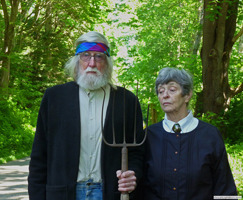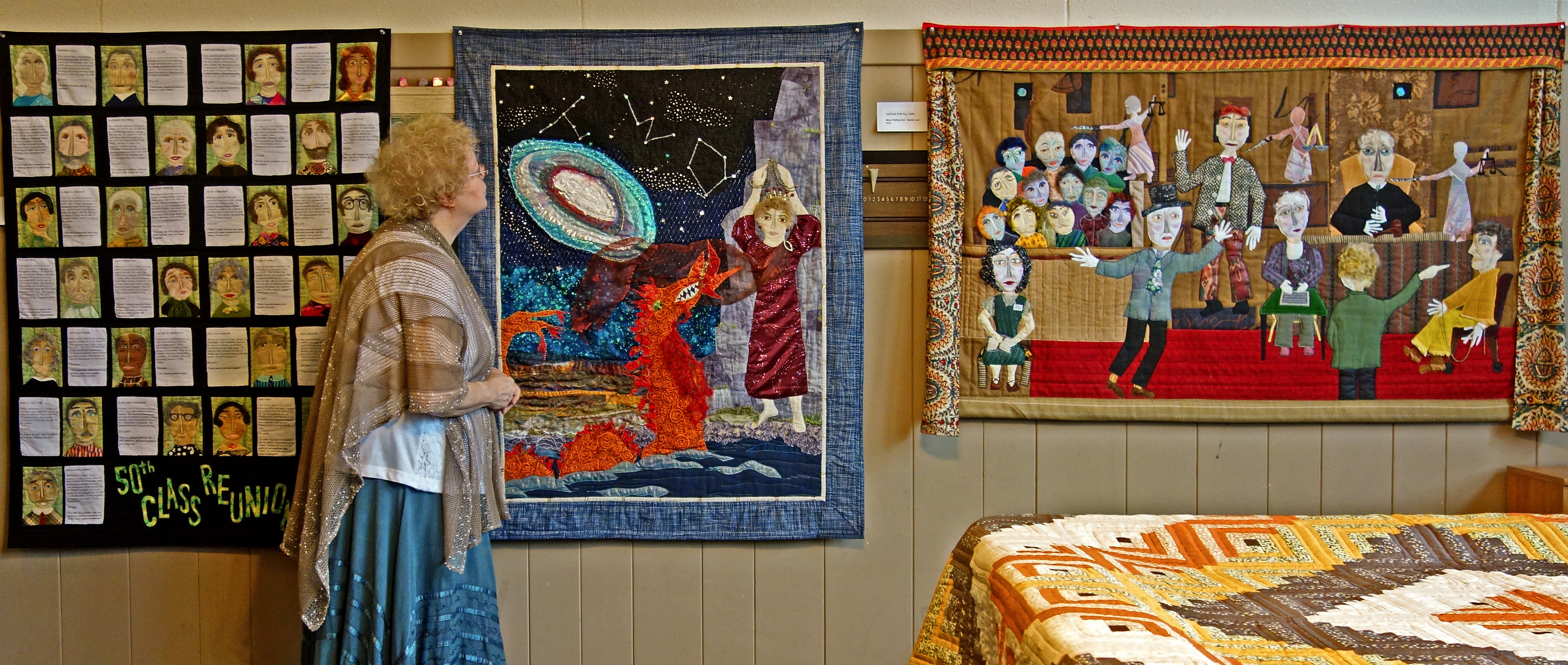Point Roberts: An Update
In earlier essays I’ve talked a bit about Point Roberts, the unique and funky “exclave” we live in. Unusual locales like ours tend to attract unusual people. One of them is the retired college teacher, world-class quilter, high-powered fund-raiser and respected blogger Judy Ross. The easiest way to introduce you to her is to reproduce, with her permission, her latest entry about The Point. I’ve included a photo of her and husband Ed Park. It follows, but if you’d like to read her blog, go here.
Sweet Sounds
by Judy Ross

This past weekend, we in Point Roberts were gifted with two extraordinary concert performances on Friday and Saturday nights. You’d think we were an urban setting to have such options for our entertainment. But, we are not. We’re a very small place that’s difficult to get to. And thus it is worth calling to all our attention what extraordinary events these were.
On Friday night, Michael Munro impressively performed four big pieces, one each by Bach, Berg, Schoenberg and Schubert. On Saturday night, The Mystic Winds (a woodwind quintette) gave us a swirling experience of many pieces associated with World War I, whose 100th anniversary we just ‘celebrated.’ (Actually, hard to think of celebrating that event.) Both performances involved professional musicians coming here to give us an evening of splendor. (Not enough that we live in a place of unusual beauty but we also get culture!)
That we get it at all is to the credit of Lucy Williams who has been producing dozens of concerts on behalf of the community and Trinity Lutheran Church for the past half dozen years or so. She started out doing it as a way to raise money for an emergency generator that the church needed in order to qualify as an emergency shelter in the event of a real emergency. And after that was paid for, she continued bringing us music of all kinds in order to fund the annual children’s summer music camp and, more recently, to help with fundraising for the new library. (Since I’m heavily involved in the new library fundraising, I’m particularly grateful to her for this help.) But, more than that, we can all be grateful to her for her gift to the community: it is not an easy matter to produce a dozen concerts a year when it is all voluntary. Lucy has been able to find individuals and groups of all kinds—jazz, fada, Barbershop, popular, classical, etc.—AND has been able to persuade them to come here to play for us without having to pay them: they perform as a gift. Furthermore, she does not sell tickets to these fine performances: it is all by donation, because it is all for the benefit of the community. A gift squared.
In Vancouver and other places where I have lived, concert tickets are not obtained by donation. It’s another part of the unusualness of Pt. Roberts that our concerts do not require us to buy tickets, although we are asked to make a donation to something that is for our own benefit and use. So extremely admirable as a community model.
I wrote last month about local institutions and our need for them to be strong. Lucy has a very strong record for the institution of producing concerts here. How can we thank her for her service? We can thank her best by going to the concerts whenever we can. She already has 10 more concerts scheduled including a trombone group and TWO choirs singing ABBA! Great. Come, enjoy! Thanks to Lucy!
==================================================
A note on Lucy to wrap this up. Lucy looks and sounds like what she is, a Texan with a classic southwestern drawl and, to boot, she’s a blond. She is also an excellent oboist and founder of the Point Roberts Wind Ensemble. As Judy notes she’s a startlingly effective organizer of musical events. Here, she appreciates the beauty of Judy’s quilts which she makes when not blogging. Thanks to Ed and Judy for the photos.

But if you hang around a bit and look closely you begin to discover other remarkable things. Turns out she’s not your stereotypical “dumb blond from Texas,” although she uses that public face to good measure. She’s an hysterical stand up comic who does the “dumb blond from Texas” bit perfectly. When she and Dick (who was a Professor of Mathematics in the California university system) lived in Los Angeles she used to work the improv clubs around town. An agent offered her a contract with plans to go on tour. She turned him down because she had too much else going on. A big piece of this “other stuff going on” you won’t discover unless you stop by their house. It is filled with French antiques. In addition to all her other talents, our dumb blond from Texas is also a respected antiques dealer with an international flair (her business partner is in Paris).
Like I’ve said before, Point Roberts attracts and holds dear some of the more unusual and compelling folks. Lucy is like a lot of us here. She and Dick visited and within a few days knew this was home.


 Arthur S. Reber
Arthur S. Reber